AI/ML
AI Agents for Hospitality: Your Guide to Smarter Guest Experiences
Written ByYash Vibhandik
CEO, Bitontree
Published:7 March 2025
30 minutes read

Imagine you are leading a hotel experiencing incredible growth. However, your team continuously faces customer inquiries, performance metrics, and order management challenges. These tasks, while essential, can take a lot of time away from focusing on strategic business decisions.
What if you had an intelligent assistant that could handle all these tasks, giving you more time to focus on your guests? Here’s how AI agents enter the hospitality industry. New technological advancements emerge, but only a few have the power to revolutionize the entire sector, like AI. With rapid adaptation, AI has been swiftly reshaping the dynamics of the hospitality industry.
While AI in the hospitality sector is still relatively nascent, its potential role is staggering. In fact, according to the AI in hospitality market research report, the industry is projected to reach a value of USD 8,120 million by 2033.
Initially, you might think that hospitality is all about personal service and has nothing to do with technology. However, technology has been intertwined with hospitality for decades. For instance, Hilton Hotels revolutionized the industry by introducing centralized reservation systems, setting a new convenience standard. With continuous evolution, Hilton Hotels uses digital innovations, like mobile check-in, personalized check-ins, and AI-driven support through its Hilton Honors mobile app.
Similarly, AI agents are here to empower hotels to make informed decisions, streamline operations, and optimize performance, ultimately improving the guest experience. However, it's just the tip of the iceberg. There’s much more to explore about the impact of AI agents in the hotel industry. Let us explore the full scope of AI's hospitality below.
Roles and Capabilities of AI Agents in the Hospitality Industry
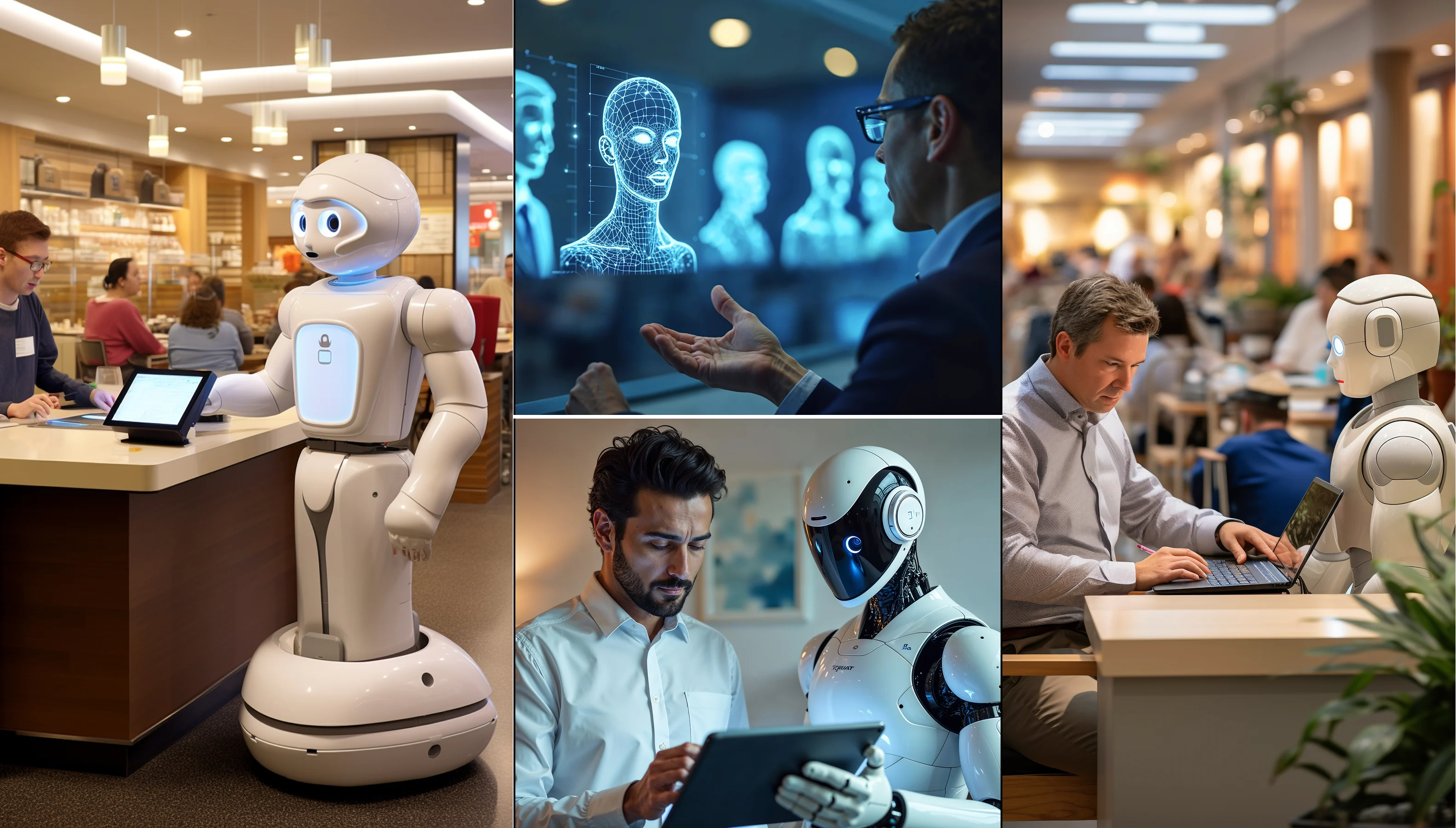
The hospitality industry is undergoing a transformative shift, largely driven by advancements in artificial intelligence (AI). As a professional within the sector, you might already be aware of how technology is shaping the guest experience and operational efficiencies.
However, the scope of AI’s impact goes far beyond simple automation or convenience. It’s fundamentally reshaping the way businesses deliver services, manage resources, and create lasting impressions on guests. Let’s dive into the essential roles and capabilities of AI agents in this dynamic field.
1.) Automation of Repetitive Tasks
One of the primary roles of AI agents is automating tasks that would otherwise be repetitive and mundane. Imagine having to respond to hundreds of emails every day, processing data, or handling customer queries — it can be overwhelming. However, AI agents can handle these types of tasks, allowing you to focus on more complex and strategic aspects of your work. They excel in processing large amounts of data quickly, freeing you from tedium and increasing overall productivity.
2.) Personal Assistants
AI-powered personal assistants, like Siri, Google Assistant, and Alexa, are becoming staples in many households. These agents are designed to help you manage your schedule, set reminders, control smart devices, and even answer questions. The key capability of these AI agents is their ability to understand your natural language, which makes them incredibly user-friendly. As AI advances, these personal assistants continue to become smarter, learning your preferences and anticipating your needs.
3.) Decision Support
AI agents are excellent at analyzing vast amounts of data and providing insights that can help you make better decisions. AI can help by quickly processing trends, patterns, and complex datasets that would take humans much longer to analyze. With AI, you can make data-driven decisions with more confidence, relying on its capability to process and predict outcomes with accuracy.
4.) Enhancing Customer Experience
AI agents play a vital role in customer service and experience. Chatbots, for instance, are commonly used to answer customer inquiries, providing quick and efficient responses 24/7. This not only saves time but ensures that customers have a seamless and engaging experience.
5.) Personalization and Customization
AI agents thrive on customization. They are designed to learn about your preferences, habits, and needs, delivering a personalized experience tailored just for you. If you’ve ever used a recommendation system like Netflix or Amazon, you’ve seen AI at work. It analyzes past choices and uses that data to offer suggestions that match the interests, helping to discover relevant products or content without having to search for them manually.
6.) Security and Safety
AI agents are also at the forefront of cybersecurity, offering tools that detect and prevent cyber threats. By analyzing patterns in network traffic or user behavior, AI can quickly identify anomalies that may indicate a security breach, ensuring the safety of sensitive data. This role is becoming increasingly important as the world becomes more digitally connected.
Types of AI Agents Used in Hospitality
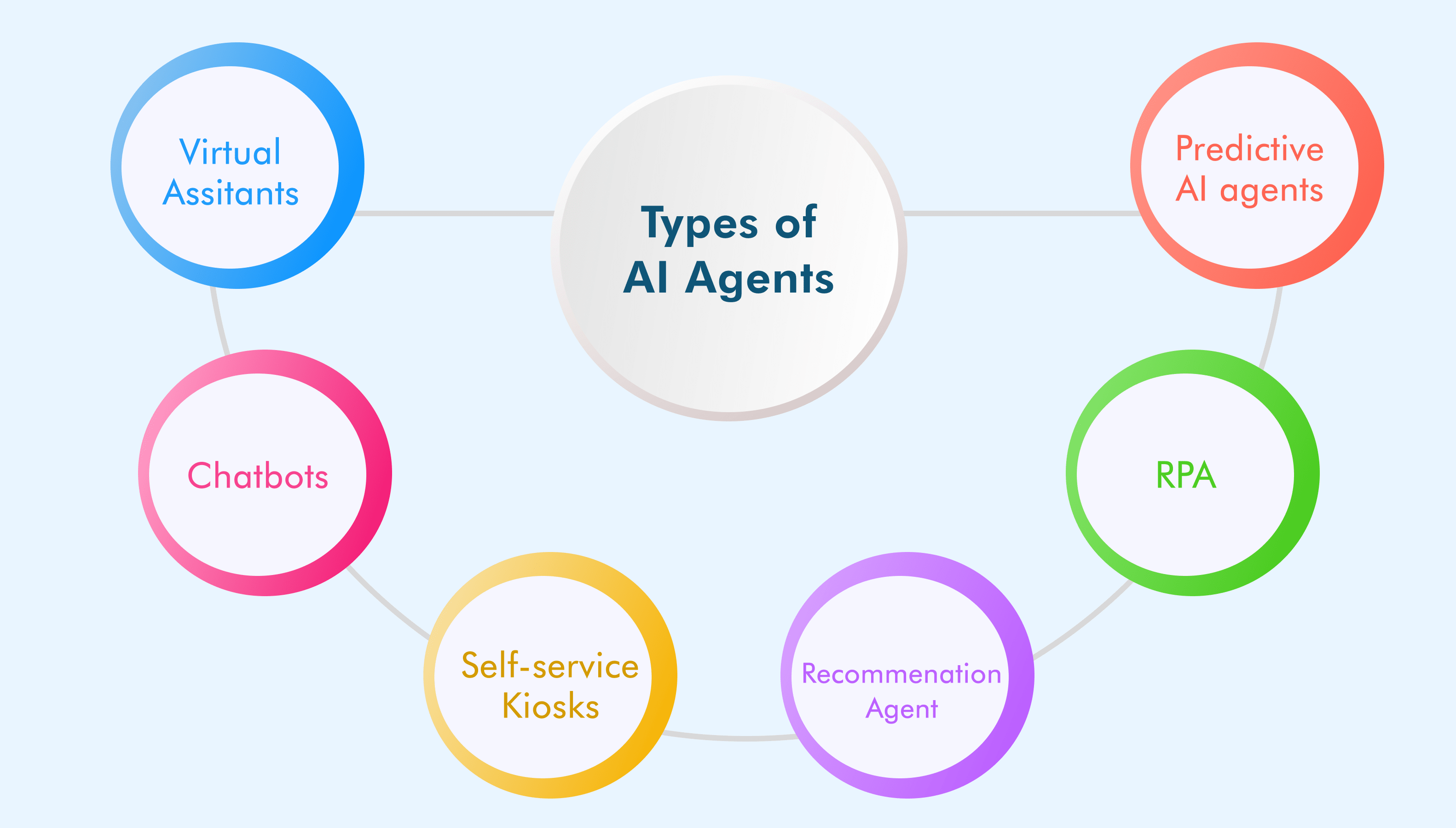
AI agents are quickly transforming the hospitality industry, making your experience more enjoyable, personalized, and convenient. Here are some of the AI agents that can be deployed to improve the customer experience in the hospitality industry:
1.) Virtual Assistants
Imagine arriving at a hotel and finding a smart assistant in your room, ready to help you with anything you need. Virtual assistants, like Alexa or Google Assistant, are increasingly common in hotels. These AI agents can help the guests control the room temperature, adjust the lighting, or even order food, all through simple voice commands. It’s like having a personal concierge right at guests’ fingertips. It can tell the guests about local attractions, restaurant recommendations, or the weather forecast, making their stay more enjoyable and convenient.
2.) Chatbots
The AI-powered agents can answer guests' or visitors' questions 24/7, providing quick solutions to common queries like booking a room, checking availability, or providing details about amenities. Chatbots can also help the staff to manage reservations and make changes without the need for human interaction. The convenience of chatting with a bot means customers get instant responses, whether it’s day or night, which can save time and effort.
3.) Self-service Kiosks
Gone are the days when visitors had to wait in line at the front desk to check in or check out. Self-service kiosks powered by AI are now common in hotels, airports, and other hospitality venues. These machines can help guests check-in, pay for services, or even check out all on their own. The AI behind these kiosks makes the process faster and more efficient. Plus, customers can often customize their options, such as upgrading their room or adding services like spa treatments.
4.) Recommendation Systems
AI-powered recommendation systems can be a game-changer if integrated into the digital product. These agents analyze the customer’s preferences and provide tailored suggestions, whether it’s dining spots, entertainment options, or local activities. The system can suggest options based on past choices, weather, and local trends. For example, if a customer has enjoyed seafood before, the system might recommend a popular seafood restaurant nearby.
5.) Predictive Analytics
Predictive AI agents are becoming a significant part of hotel operations. These systems analyze guest data to predict future needs or preferences. For example, AI can predict when a guest might need a towel or room service, allowing the hotel staff to be proactive rather than reactive. This helps ensure that you have everything you need without having to ask for it, making your stay even more seamless.
6.) Robotic Process Automation (RPA)
In some high-tech hotels, robots powered by AI are taking on tasks like delivering towels, toiletries, or room service. These robots can navigate through hallways and elevators, delivering items directly to your door. They not only add a futuristic touch to the guest's stay but also free up hotel staff to focus on more complex tasks, ensuring better overall service for you.
Building Blocks of AI Agents for Hospitality
AI agents are built to seamlessly integrate into hospitality businesses, transforming the guest experience and operational efficiency. But how do they work, and what makes them tick? Let’s find out.
1.) Natural Language Processing (NLP): NLP allows AI agents to understand and process human language. This is the backbone of communication with guests, whether it’s through voice or text. It ensures that when the guests ask an AI assistant a question—like, “Where is the nearest restaurant?”—it can respond in a natural and human-like way.
2.) Machine Learning (ML): This is where the magic happens. Machine learning helps AI agents “learn” from data over time. As guests interact with the system, AI agents improve their responses and suggestions, tailoring each experience to your preferences. The more data they have, the smarter they become.
3.) Predictive Analytics: Predictive analytics help AI agents anticipate your needs before you even make a request. By analyzing patterns in the behavior, they can predict the needs, making the stay feel effortless.
Use Cases of AI Agents in Hospitality
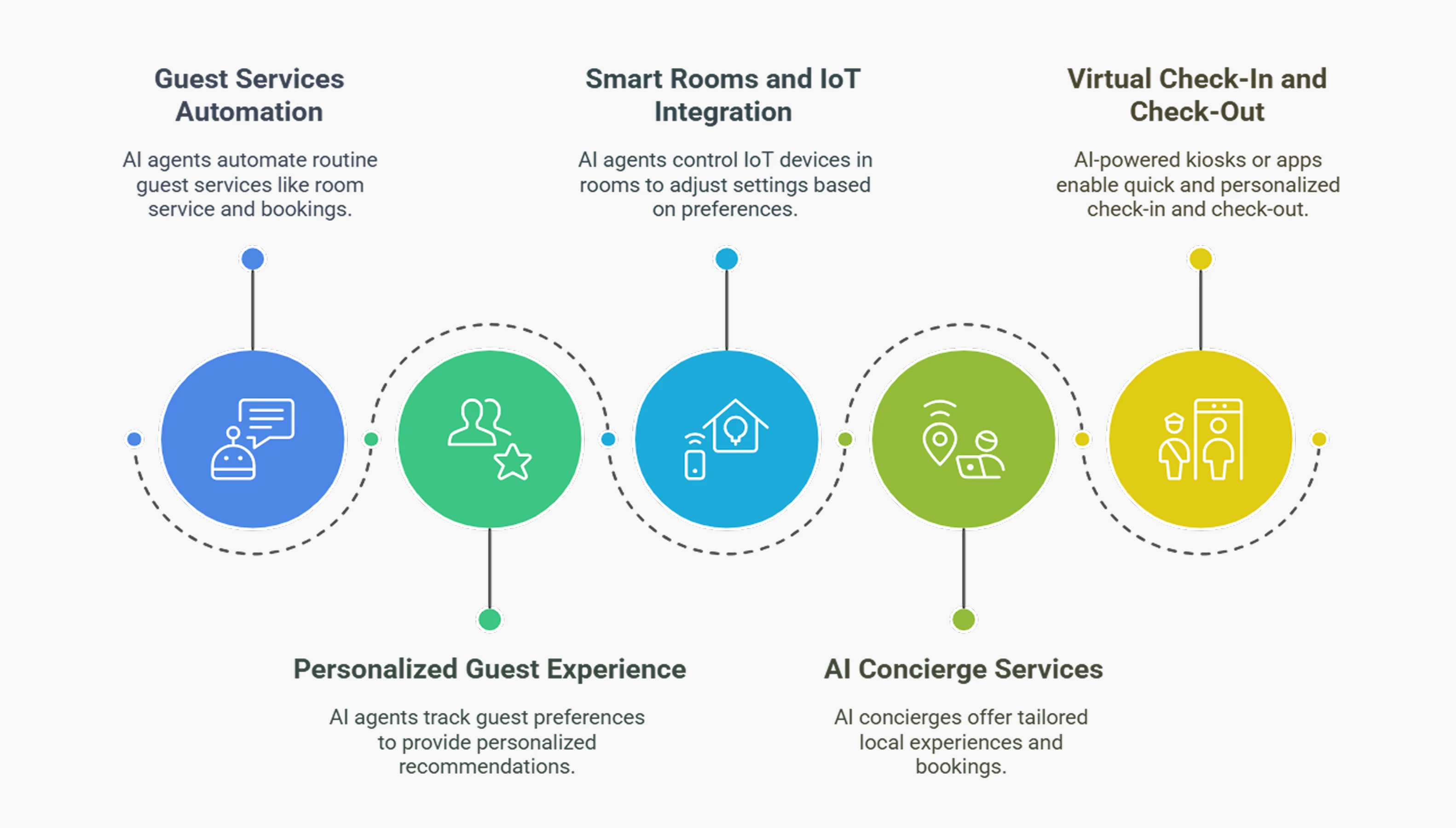
AI agents in the hospitality industry aren't just futuristic ideas—they’re here, and they’re making a real impact. You’ve likely already encountered them in some form. Here’s how they’re changing the game:
1.) Guest Services Automation: AI agents are used to automate routine guest services like room service orders, booking tickets, and providing local recommendations. Imagine a guest needs extra towels. Instead of waiting for someone to take their request, they can text the AI assistant, and within minutes, the request is fulfilled.
2.) Personalized Guest Experience: AI agents can track the guests preferences and make the stay feel custom-tailored. From recommending a specific type of pillow to suggesting a spa treatment based on the past activities, these systems use data to make you feel right at home.
3.) Smart Rooms and IoT Integration: In the hotel room, smart technology is just a tap away. AI agents control IoT devices in the room—adjusting the lighting, temperature, or even the entertainment options based on your preferences. This integration makes your experience feel high-tech and streamlined.
4.) AI Concierge Services: AI concierges can provide tailored local experiences, recommend restaurants, and even book tickets for shows or events, making your travel smoother and more enjoyable.
5.) Virtual Check-In and Check-Out: You walk into a hotel, and instead of waiting in line, you check in through an AI-powered kiosk or mobile app. It’s quick, easy, and personalized, offering you a seamless start to your stay.
Benefits of AI Agents in Hospitality
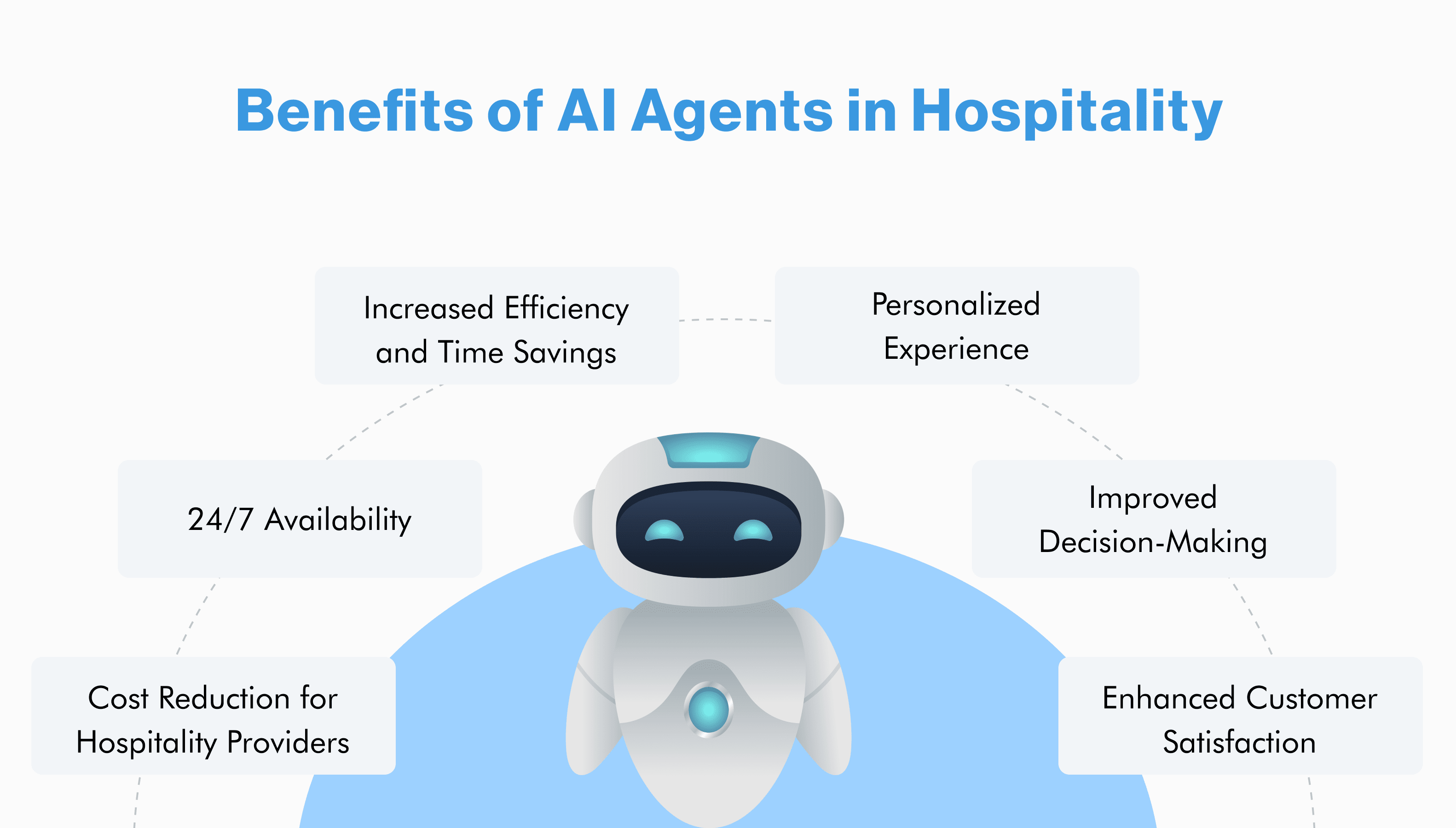
As technology continues to evolve, the potential for even more seamless and enjoyable experiences for you is endless. Wouldn't it be exciting to see how AI further elevates your guests next stay? The benefits are undeniable:
1.) Increased Efficiency and Time Savings: AI agents can handle tasks that would otherwise take up a lot of your time, such as answering FAQs, booking rooms, or providing directions. This means the visitors get to focus on enjoying the stay rather than waiting for assistance.
2.) Personalized Experience: Because AI agents learn from the preferences, every interaction becomes more personalized. From room setup and dining options to entertainment choices can be tailored to guests’ likes, creating a truly individualized experience.
3.) Cost Reduction for Hospitality Providers: For hotels, restaurants, and other businesses, AI agents can reduce the need for large staff teams to handle repetitive tasks. This can cut operational costs and allow employees to focus on more complex or high-value tasks, benefiting both businesses and guests.
4.) 24/7 Availability: AI agents don’t sleep, so they’re always ready to assist guests, whether it’s midnight or early morning. Customers or visitors never have to wait for business hours to get help with a request or query about your services.
5.) Enhanced Customer Satisfaction: When AI agents are used effectively, they enhance the guest experience by making it more efficient, responsive, and personalized. This means you’re more likely to leave with a positive impression, which can lead to repeat visits and positive reviews.
6.) Improved Decision-Making: AI tools provide analytics that can help businesses understand guest behavior and improve offerings. If you’ve ever received a personalized discount for your next stay, it’s likely powered by AI analyzing your past bookings and preferences.
How Bitontree Can Help You Build AI Agents for Hospitality?
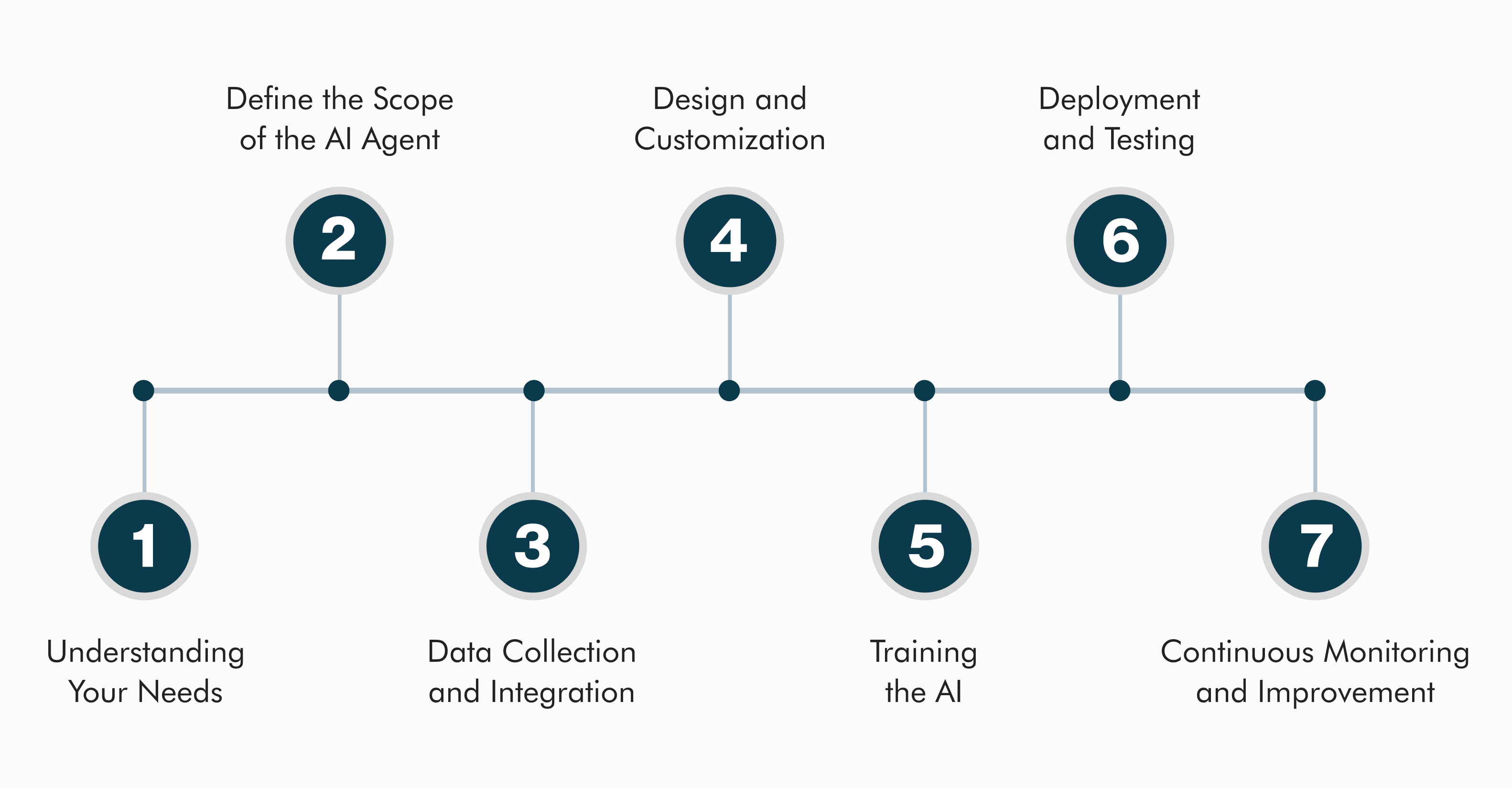
By working with Bitontree, you can build a tailored AI agent that not only automates routine tasks but also enhances the guest experience, boosts operational efficiency, and drives more personalized interactions—all leading to higher customer satisfaction and loyalty. Let Bitontree help you revolutionize your hospitality business with smart AI technology.
- Step 1: Understanding Your Needs
Our first step is a comprehensive consultation to understand your specific needs. Whether you require a virtual concierge, automated booking assistance, guest query management, or personalized recommendations, we take the time to analyze your goals and pain points.
- Step 2: Define the Scope of the AI Agent
Once we understand your requirements, we define the AI agent’s scope, like handling customer inquiries via chat or voice. By outlining these parameters, we create a clear roadmap for development, ensuring the AI delivers value where it’s needed most.
- Step 3: Data Collection and Integration
An AI agent is only as good as the data it operates on. We work with you to collect and integrate necessary data from various sources.
- Step 4: Design and Customization
We believe in creating AI agents that reflect your brand identity. Our team designs a user-friendly interface and customizes the AI’s tone, personality, and conversational flow to match your brand voice.
- Step 5: Training the AI
To ensure high accuracy and effectiveness, we train the AI using real-world datasets, historical customer queries, and industry-specific information. Our iterative approach involves refining the AI’s understanding through supervised learning and natural language processing (NLP) techniques.
- Step 6: Deployment and Testing
Before full implementation, we conduct rigorous testing to ensure seamless operation. The AI is deployed in a controlled environment where we simulate real customer interactions, identify any issues, and fine-tune responses.
- Step 7: Continuous Monitoring and Improvement
We continuously monitor the AI’s performance, gathering insights from customer interactions to improve accuracy and efficiency. Regular updates and optimizations help the AI adapt to evolving guest expectations and business needs.
The Bottom Line
Artificial Intelligence, with its diverse applications, has seeped into nearly every aspect of our daily lives, and the hospitality industry is no different. The hospitality sector has always embraced innovation, constantly exploring fresh avenues to enhance guest experience and boost operational efficiency. In recent times, the emergence of AI has opened up thrilling prospects for hotels to transform their services and personalized guest interaction and spur revenue growth.
As AI continues to rise in prominence, you must carefully choose the right partner for AI integration to ensure successful implementation and maximize the benefits of this transformative technology. At Bitontree, we provide innovative solutions to craft your AI agent that aligns with your specific needs. By partnering with us, you can position your hospitality brand at the forefront of the digital revolution, drive growth, and stay ahead of the competition.
Curious About AI in Hospitality? Let Us Show You the Possibilities
Related Blogs
Frequently Asked Questions
AI agents in hospitality are intelligent systems that automate and enhance guest services, including chatbots, voice assistants, recommendation engines, and smart room automation, to improve efficiency and guest experience.
AI agents can suggest dining options, entertainment, local attractions, and personalized services based on guest preferences, past behavior, weather conditions, and trends.
These engines employ reinforcement learning, where AI continuously refines its suggestions based on real-time guest interactions, feedback, and behavioral shifts, ensuring more accurate personalization.
AI-powered voice and text assistants provide real-time translation, ensuring seamless communication with international guests and enhancing their overall experience.











